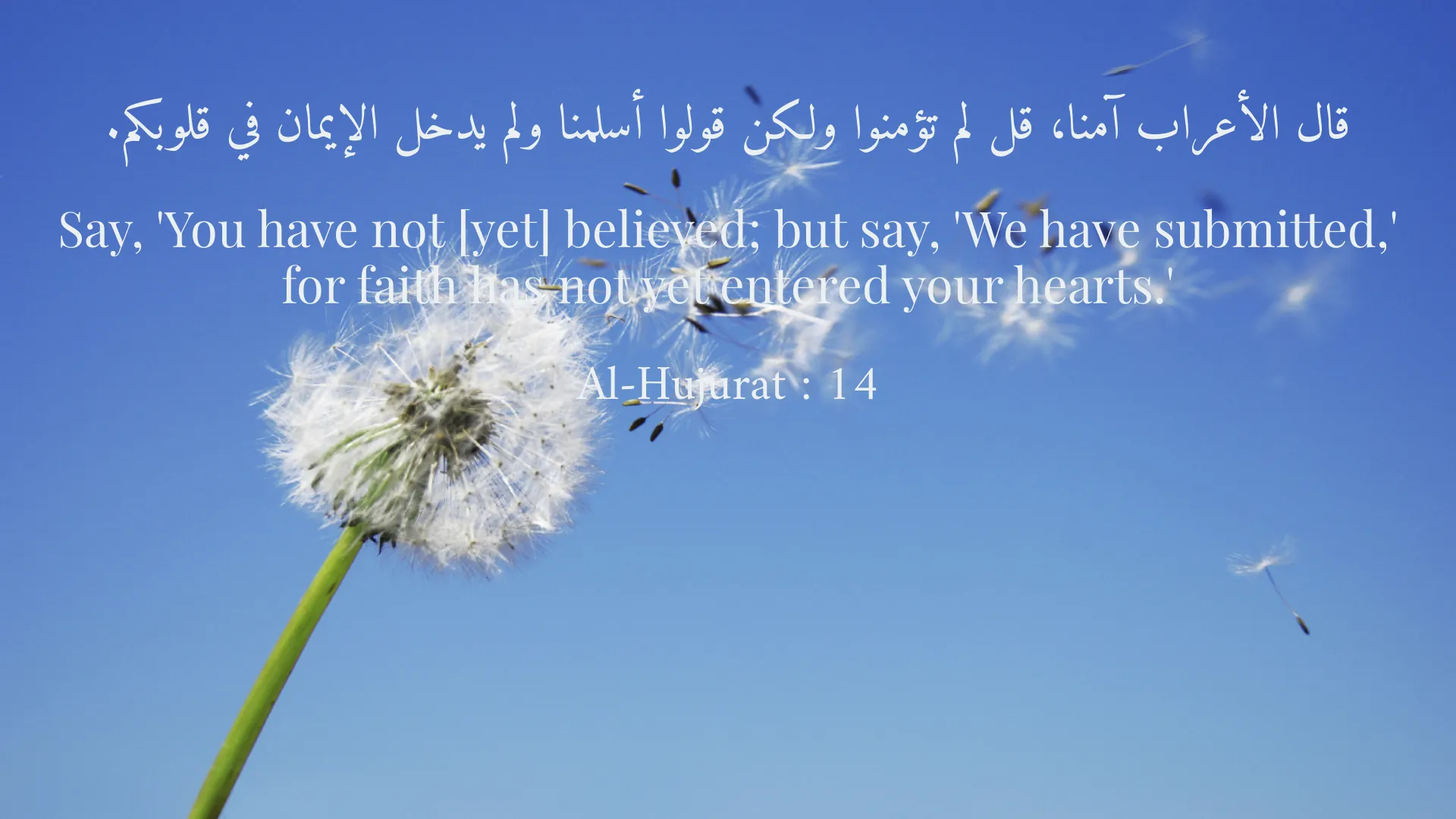Quranic Answer

The Concept of Faith in the Holy Quran: A Deep Dive into Spirituality and Righteousness Faith, as encapsulated in the Holy Quran, represents a profound and multifaceted concept that transcends the simplistic understanding of belief. It is an inner state that is deeply rooted in the heart, evolving beyond mere acknowledgment of religious tenets to a genuine connection with the divine. This article will explore the nature of faith as presented in the Quran, particularly focusing on its implications concerning knowledge, feelings, actions, and its genuine manifestation in an individual’s life. The Quran offers a rich tapestry of teachings on faith that highlight its essential role in the life of a believer. Surah Al-Hujurat, verse 14 provides an insightful perspective on this matter: 'The Bedouins say, 'We have believed.' Say, 'You have not [yet] believed; but say, 'We have submitted,' for faith has not yet entered your hearts.' This verse articulates a critical distinction between verbal proclamation and inner belief. It reveals Allah's skepticism regarding the sincerity of their faith, emphasizing that lip service alone is insufficient. True faith must permeate the heart, evoking a transformation that compels the individual toward righteousness, devotion, and a sincere relationship with God. In dissecting this verse, one realizes that faith, as per Quranic doctrine, is not merely about declaring one’s religion or adhering to rituals. Instead, it is a deep-seated conviction that organically develops within, influencing every facet of one’s being and guiding them towards moral and ethical conduct. The emphasis on the phrase 'for faith has not yet entered your hearts' underscores the necessity for an internal awakening or realization that breathes life into the brave declaration of faith. This understanding is integral as it signifies that faith is not a one-time event but a continuous journey of inner growth and self-discovery. Moreover, Surah Al-Anfal, verse 2 draws our attention to another critical aspect of faith: 'The believers are only those who, when Allah is mentioned, their hearts become fearful, and when His verses are recited to them, it increases them in faith, and upon their Lord they rely.' This verse delineates the emotional response that true believers have towards divine reminders and scriptural recitation. It illustrates that faith engenders a combination of reverence, dependence, and trust in God, propelling believers toward an increased awareness of their Creator. The juxtaposition of fear and faith is particularly compelling. It is not the fear of punishment but a loving reverence for Allah’s majesty that fortifies a believer's faith. The heart’s fear aligns with the awe and respect instilled by acknowledging Allah's omnipotence and intimacy with creation. This emotional resonance signifies that true faith is alive, impacting one’s senses, shaping responses, and fueling a commitment to righteous actions. When believers receive divine revelations yet remain unmoved or indifferent, one can conclude that the seed of faith has not taken root. As we examine the relationship between faith, knowledge, and action, it is imperative to clarify that while knowledge is a vital component of faith, it does not singularly define it. Knowledge serves as a tool that informs and enlightens the believer about the divine attributes, the purpose of existence, and moral responsibilities. However, knowledge devoid of intention or righteous action is inadequate. Indeed, the Quran emphasizes the criticality of actions in cultivating faith. In several verses, righteous deeds are presented as indicators of true faith. For instance, Allah instructs believers to engage in acts of worship, charity, and justice, intertwining these actions with their belief in Him. Faith, therefore, is characterized by a synergy between knowledge of divine commandments and the conscious choice to embody those teachings through actionable, righteous behavior. Authentic faith calls for spiritual recognition—an acknowledgment that goes beyond cognitive understanding. It involves the heart, emotions, and the will, harmonizing the internal with the external. Practicing faith requires obedience to divine commands, which forms the fundamental pillars of faith. The believer’s reliance on Allah becomes apparent through their unwavering commitment to His guidance embedded in everyday life. From various Quranic teachings, it is undeniable that faith is a journey marked by progress and sincerity. It requires self-reflection and a pursuit of nearness to God. This relationship necessitates prayer, reflection, and engaging with the Quran as a lived experience rather than a dogmatic obligation. In conclusion, faith, as illuminated by the Holy Quran, is an intricate tapestry woven with heartfelt conviction, knowledge, emotions, and righteous deeds. The teachings emphasize the distinction between mere declaration and profound inner belief. Ultimately, the essence of faith encompasses a triad of heartfelt recognition, dedicated action, and steadfast obedience to God’s commands. This multidimensional approach paints a holistic picture of what it means to be a believer, reminding us that our faith can be as dynamic and transformative as our relationship with the Almighty. As believers, our journey towards faith is continuous—rooted in the heart, cultivated through knowledge, and expressed through our actions. The true test of faith lies not merely in what we profess with our lips but in how we embody those beliefs through the rhythm of our daily lives.
Related Verses
قال الأعراب آمنا، قل لم تؤمنوا ولكن قولوا أسلمنا ولم يدخل الإيمان في قلوبكم.
Say, 'You have not [yet] believed; but say, 'We have submitted,' for faith has not yet entered your hearts.'
Al-Hujurat : 14
إنما المؤمنون الذين إذا ذكر الله وجلت قلوبهم وإذا تليت عليهم آياته زادتهم إيمانًا وعلى ربهم يتوكلون.
The believers are only those who, when Allah is mentioned, their hearts become fearful, and when His verses are recited to them, it increases them in faith, and upon their Lord they rely.
Al-Anfal : 2
Short Story
One day, Adel decided to strengthen his faith. He went to the mosque and began reading the Quran. Over time, he realized that merely acquiring knowledge wasn't enough; he needed to trust in his heart and take actions that manifest faith. He started helping his parents daily, and through this act, he experienced greater peace and faith.